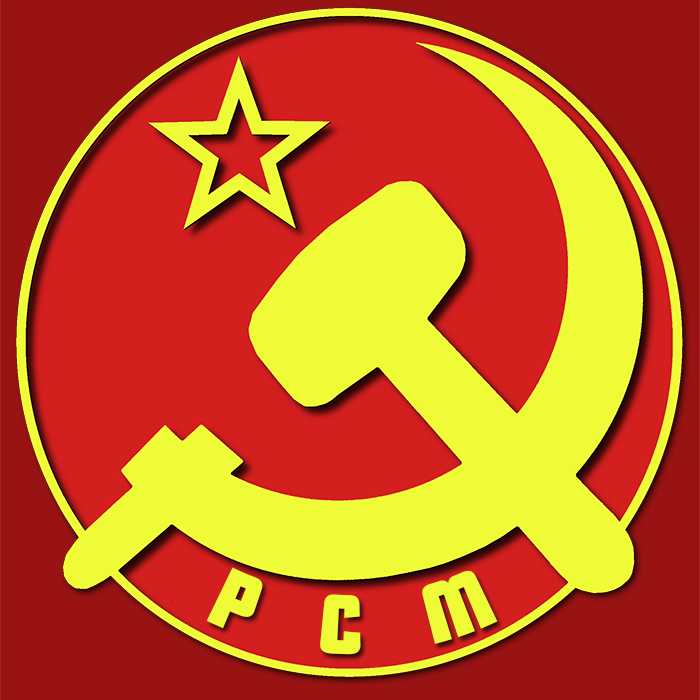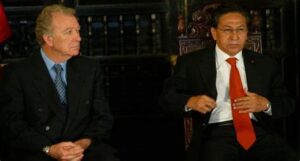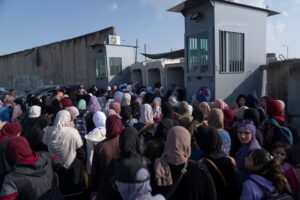
EXCLUSIVE: Interview with the Maoist Communist Party of France on the development of the class struggle in the country
Introduction. As readers all over the world know, there has been an extraordinary development of the class struggle in France in the last months. With great pleasure we have seen revolutionary forces in all the parts of the country taking a notable role in this struggle. With great pleasure we have the possibility to make an interview, with the comrades of the Maoist Communist Party of France (PCmF), that have been playing a leading role in these struggles.
TRH: In the name of all of us, who work with The Red Herald, we know that we are in a very intense class struggle, and appreciate you taking some time to give the readers deeper insight in the class struggle in the country and the role played by your Party. Can you give us an introduction to the background and the present situation currently going on in your country?
PCmF: To begin we would like to thank the workers of The Red Herald for giving us an interview. We are honored to be able to express ourselves in this news page, and it will have an important impact in our struggle.
On the situation of the class struggle in France, it is a result of two things that are intimately linked.
The general crisis of imperialism, crisis of decomposition, which reactivates class struggle in the whole world, is the main aspect. It opens a new period of world revolution, which is reflected in the country, through its internal base, or more so through the own specifics of the country. Which are: an imperialism in crisis, notably with accelerated deindustrialization, with a notable re-flux of French imperialism, notably in Africa and in Europe, too.
The other aspect is the own history of the class struggle in the country, a new period has been opened, which we can say started with the Yellow Vest movement (2019), which was a great return of class struggle in the country, in which the central question was the question of power. A question that always comes to the words of the masses, masses that are confronted with an accelerated reactionarization, which is a result of the crisis of the regime. What marks an opening of a crisis of regime, the presidency of Macron is a symptom of the crisis of the fake republic, which by essence is Bonapartist, a republic whose origin is the military coup in 1958. The current struggle, is a continuation of the struggle opened by the Yellow Vests and goes beyond the scope of the pension reform. The need of restructuring of French imperialism. The necessity of rearmament so that French imperialism can take its share in the division of the world, only serves to aggravate the crisis, pushing the masses to combativeness, always more to be the central actor of the political life of the country. The current struggle that we are facing, where exemplary the level of combativeness of the proletariat affirms itself, is only the beginning of a new period, where the old world that we know is becoming defunct with speed.
Concretely in the working class, the new that is happening expresses itself in the contradiction between the union base and the union leadership. The union leadership find themselves in a contradiction that is impossible to overcome, as they function as an intermediary body, which is to be the link between bourgeois State and exploited proletariat. And it is in the process of exploding. Tocqueville (French bourgeois thinker of the 19th century) said not so long before the great bourgeois French revolution that there is an empty space between the king and the people, and we are coming back to that situation.
TRH: So, listening to what you say, it sounds like democracy is in a deep crisis in France, is this something that you will share, how is this linked to the election of Macron? Did he have a big popular support?
PCmF: To understand the situation we must understand the form of government which in the current bourgeois democracy is the French republic. In the fifth republic the decisive factor is the president, and the parliament as a principle of bourgeois democracy, exist as an anti-chamber of presidential decisions. In the previous situation, which starts in the new regime in ‘58 up to Macron, the parliament was used as a tool for so called co-habitation of bourgeois political forces and the so-called change of government color, with two parties handling the State: the right and social-democratic. In the first term of Macron, the crisis was expressed with the fall of this two parties and the decomposition under Macron’s leadership. The parliament thus officially become the anti-chamber of the president. Because of this, the weight of bourgeois political parties, their ability to mobilize and the trust of the masses as the primary factor in bourgeois democracy was shattered. With, for example, the legislative election – the election for parliament which happened after Macron was elected in 2017 – for the first time had the majority of non voters boycott. This tendency deepen the fester, with all the other elections seen less than 50% turn out. The election of 2022, last year, was a new stage in this crisis where Macron got elected very badly in the own words of the bourgeois media. This means the reason he won a second term is not because of his program, is not the weight of his political party. But only in so far as he was opposed to Le Pen in the second round (the leader of the fascistoid National Assembly, previously National Front). An adversary that he himself had chosen since 2017. Then, in the parliamentary elections he did not get majority, but relative majority. Which means that to govern with parliament he will need coalition, but the fifth republic is not made for coalition but for presidential rule, so for the year 2022 to 2023 Macron has openly relied on direct governmental decisions to pass laws (article 49.3 of the constitution allows the government to pass any law with out parliament). And in the current crisis he has stated that he will rule by decree. The demo-bourgeois principle of parliamentarism is basically death, because the social-democrats have no other tools than the parliament and the parliament is defunct. And the far right has parliamentary seats, but uses them to take advantage of the regime, which is to be the president and have presidential rule, so currently no forces present a solution to a crisis of democracy. This means a political grid lock, in which the political crisis can turn into crisis of regime, because the bourgeoisie can not govern as it has done until now, its not a question of alternative politics by opposition, or just Macron putting program into place, but all bourgeois political forces have the basic orientation of tuning the crisis into a crisis of regime.
TRH: In this situation of deep crisis and in a country, which is – at least in Europe – recognized as having a particularly combative proletariat, how could Macron come up with such a stupid idea to an assault of the working population. What is his motive?
PCmF: The pension and social services in France weight approx 330 billions of euros a year, that is more or less 15% of the GDP. Thus it is an enormous amount of capital which has been put in this place because of the armed struggle of the proletariat in the second world war, the partisan warfare led by the Communist Party. Since the beginning of this the bourgeoisie has striven to dismantle this funds and use them as circulating capital for investment. Because of the crisis of French imperialism, Macron and its predecessors have tried to reform the system of pensions for two goals. Number one is to increase the exploitation of the working class, another to keep up with other imperialist countries, especially in western Europe. Because, for example, the retirement age in France, which was 60 only 13 years ago, was very low compared to German imperialism, British imperialism, or other rival powers. The second goal is the appropriation of the mass of capital that pension funds represent for private investment. In this sense Macron proposed a first reform before the so called Covid crisis, the goal of this reform was to put much of the pension fund under the administration, the management of pension funds, by private funds, which can be defined as parasitical, financial capital of decaying imperialism. The goal of this pension funds is to increase over-exploitation of oppressed countries in the case of French imperialism, mainly in Africa. In this sense the new reform of Macron, is a necessity for inescapable struggle of French imperialism against its decay. It is the financial aristocracy, the imperialist bourgeoisie going to their treasure coffer and taking everything they can to escape the downfall that they see coming. An example of this is that Macron uses the reform as a way to prove to the financial capital that he can do brutal reforms, in order to justify the deepening of the debt crisis of the French State, to serve the rearmament of the State. The prove of this is that the pension reform came with a 400 billion in check for military rearmament.
TRH: Thank you comrade, very enlightening. If we now turn the focus and talk about the other side of the contradiction, the people, one thing that we have been able to see in the context of the struggle of the pension reforms. Revolutionary forces in some places have been able to link the struggle of the core of the industrial proletariat with the deepest and poorest masses of the proletarian neighborhoods. Is this image correct, has this division of the exploited been overcome. And how to you see this question?
PCmF: The main aspect is that for the first time since decades, a contingent of revolutionary forces is led by the Communist Party in reconstitution. When we say lead, we mean application of democratic centralism, which means from top to bottom and from bottom to top, acting as a whole. The proletariat of France is found as is the case in the totally of the imperialist countries in a situation of atomization between several sectors. The working class, and the industrial working class at its heart, the other workers who have temporary work, and the popular neighborhoods where the deepest masses are concentrated. Our historical problem is the division between this two sectors of the class. It is one of the central preoccupations as communists to ideologically, politically and organizationally reunify the class. Up to this day our main political work was done in the popular neighborhoods. With this struggle we face the contradiction that we have to move to the organized sectors of the working class. The revolutionary situation in France can not be complete without the unity of the proletariat, our mass work has enabled us to link ourselves with a small contingent of inhabitants in the popular neighborhoods, which has enabled us to bring to the workers picket-line proletarian women of this neighborhood that have participated actively in the struggle with the workers. This can seem insignificant because we are talking about a few people, but in fact this is a big victory because it opens immense perceptive, because it opens the way we will follow. Another action of similar nature was leading a strike and blockade of the contingent of Carrefour (supermarket chain) workers inside a popular neighborhood which rely both on the workers and inhabitants to go against not only the reform, but also the raising prices.
TRH: So, you would say that the class solidarity is developing?
PCmF: Yes, because in the concrete moment of struggle such as the one we live resonates everywhere in society and the deepest masses, only awaits the communists to link decisively with the working class of which they are part of. We saw this with the Yellow Vests as well.
TRH: We know that the fascist forces in France are quite strong, for example the National Assembly, and in the last presidential election campaign there was an extremely chauvinistic anti-Muslim campaign. How is this campaign of the ruling classes to divide the people in foreign and native, how do you fight this?
PCmF: The proletariat in France with the development of French imperialism and its many colonies all over the world has for a long time been so to say a rainbow, the bourgeoisie is using an ethnic and religious pretext to increase prejudices among the masses and the fascistoid organizations aim at diving the people along this lines. The weight of revisionism has allowed the rotten division of the people, whereas before, when the Communist Party was united, those divisions did not take place, could not have been possible. To combat this the class struggle is the most intense forge because workers no matter the color, no matter the religion find each other in common struggle for common demands and unite on this grounds understanding that what divides them is much less than what unites them, and in this sense we saw for example in the Yellow Vest movement many proletarians who come from cities where there are less people with immigrant background suddenly lived in their flesh the same hatred for the police as many proletarians from popular neighborhoods with immigrant background, who are harassed everyday. The State is acting with reactionarization to try to categorize opposite forces, people in rebellion as terrorist, which is a category that they have used for 20 years to divide the people along religions lines. So in the masses during this times of struggle the division engineered by the bourgeoisie is shattered, because of this the bourgeoisie intensifies its effort through the restructuring of the State and propaganda by the bourgeois media to deepen the division. It is condemned to fail, because the working class in France has shown before to be united beyond this ethnically and religions lines and more and more will do it again. In our daily work, we work together with the deepest masses, we do not go into religion or ethnicity as a political subject, of course that racism exists, but what we do is unite upon the concrete problems that the masses face. Mainly African Muslim masses who are always treated in function of this, the proletarian line frees them because proletarian internationalism unites us all in one fight.
TRH: Now, at this moment it seems quite clear that Macron will pass the law, of the so called pension reform. [This happened a few days after the interview during the night from Friday to Saturday, 15th of April] How do you evaluate the perspective of the struggle in the up coming period, closing on to the first of May.
PCmF: For us it is clear that this battle for pensions is the opening of new sequence, and the framework of this sequence is the remaining 4 years of Macron presidency. The great question in the coming month will be the question of raising prices. As communists without relentlessness in daily struggle we will participate in aggravating the crisis of the regime, and unmasking even more to the masses the character of the bourgeois State, which is dictatorship of Bourgeoisie. In this sense, we plan on making the first of May a most special day, when we will push for combativeness and take part in the organizing of the rage and anger of the masses. Differentiating ourselves from revisionists and opportunists, who wish to make of this glorious day a formality.
TRH: Final question, your Party is a member of the new founded International Communist League, how do you see the relationship of the struggle in the country and the development of the struggle in the world?
PCmF: We see in France a revolutionary situation in uneven development, which expresses itself in the situation in Europe. In the process of the world proletarian revolution the great work started by, renewed by the comrades of the International Communist League can only bring us enormous joy and create the possibility of linking our struggle with the storm centers of the world proletarian revolution that are the oppressed nations. These serve as beacons for reconstitution of the Communist Party under the guidance of Maoism and the hastening of the class struggle, with in perspective of the armed struggle, that is People’s War. We walk hand in hand with the communist of the oppressed nations, particularly with the peasant masses.
TRH: Thank you for your precious time, allow us to send the heartfelt greetings to all the comrades in France. We wish you success and look forward to be able to report of your future development and victories, thank you comrades.

